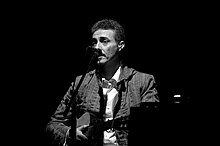Nueva canción
Nueva Canción (literally New Song ) is a form of political song that originated in Latin America . This form of Latin American music first emerged in the 1950s and 1960s in Argentina , Chile and Uruguay , but soon became popular in Central America as well.
Characteristics, origin and distribution
Violeta Parra began to research the folk music of rural Chile in the 1950s and combined it with newer socio-critical elements. Their children Isabel and Angel ran a club La Peña de los Parra in Santiago de Chile from 1965 , where Víctor Jara often performed. Musically, the draws Nueva canción from the Andean music , the Música negra , Spanish music, Cuban music and other Latin American folklore . The main source is the Chilean cueca , a rural form of song. Typical themes of the Nueva canción are the poverty of the people, their struggle for better living conditions, the Unidad Popular , imperialism , democracy , human rights and religion . Many protest songs were written accordingly .
The 1973 coup against Salvador Allende in Chile had a major impact on the growth of the genre as the whole musical movement had to go underground. During the days of the coup, the famous singer and songwriter Víctor Jara was tortured and murdered by the new regime under Augusto Pinochet . Groups like Inti-Illimani , Quilapayún and Tiempo Nuevo found refuge outside the country. The military government under Pinochet was in power until 1989 and banned traditional Andean musical instruments in order to suppress the Nueva Canción movement. After Pinochet's departure, the stadium in which Victor Jara had been killed was renamed the Estadio Víctor Jara .
Most of the songs are from the guitar and often by the quena , zampoña , the charango or cajón accompanied. The text is mostly in Spanish with a few words in indigenous languages . While Chile produced the most Nueva Canción artists, the Nueva canción was popular in almost all Spanish-speaking Latin American countries, and was also popular in Europe in the 1970s.
Musician
Argentina
Brazil
Canary Islands
Chile
- Rolando Alarcon
- Aparcoa
- Payo Grondona
- Illapu
- Inti-Illimani
- Víctor Jara
- Los Jaivas
- Patricio Manns
- Julio Numhauser
- Sergio Ortega
- Ángel Parra
- Isabel Parra
- Violeta Parra
- Héctor Pavez
- Quilapayun
- Osvaldo "Gitano" Rodriguez
- Horacio Salinas
- Schwenke & Nilo
- Jose Luis Sepulveda
- Jose Séves
- Tiempo Nuevo
- Francisco Villa Castro
- Sol y Lluvia
El Salvador
- Cutumay Camones
- Banda Tepehuani
- Yolocamba Ita
- Los Torogoces de Morazan
- Luis Lopez y el Grupo Anastacio Aquino
Guatemala
- Alux Nahual
- Canto General
Nicaragua
Paraguay
Puerto Rico
- Haciendo Punto en Otro Son
- Roy Brown
- Aires Bucaneros
- Moliendo Vidrio
- Atabal
- Andrés Jiménez
- Antonio Caban Vale (El Topo)
- Danny Rivera
- Taone
- Zoraida Santiago
Uruguay
Venezuela
Peru
- Tania Libertad
- Hijos del Sol peru
Los Angeles, California, USA
- Sangre Machehual
- Sabia
Nueva Trova: Cuba
- Silvio Rodríguez
- Pablo Milanés
- Carlos Puebla
- Sara González
- Noel Nicola
- Vicente Feliú
- Carlos Varela
- Augusto Blanca
Canto Nuevo: Mexico
- Los folkloristas
- La Peña Móvil
- León Chavez Teixeiro
- Julio Solórzano
- Cade
- Anthar y Margarita
- Oscar Chavez
- Grupo del Cóndor Pasa
- Sanampay
- Escalón
- Inca taki
- Guadalupe Pineda
- Víctor Jara Group
- Eugenia León
- El "Negro" Ojeda
- Guadalupe Trigo
- Icnocuicatl
- La Nopalera
- Marcial Alejandro
- Caito
Nova Cançó: Catalunya
literature
- Jan Fairly: The guitar is a weapon, the song is a bullet. Nueva canción . In: Simon Broughton et al. (Ed.): World music. Rough Guide . JB Metzler, Stuttgart and Weimar 2000, pp. 714-723.

